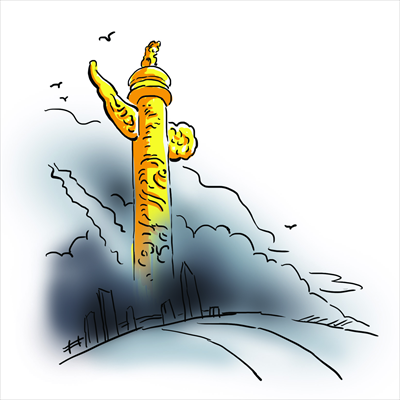Sino-American dreams stem from trade

It is inspiring to hear an emerging voice from China's new leadership about the "Chinese dream." New Chinese President Xi Jinping's rhetoric has been echoed throughout the Chinese media.
It is an opportune time for China to revive its glorious past referring to Xi's Chinese dream. China's unparalleled economic rise, highly civilized culture, and far-reaching Confucian ideology not only made a contribution and influence around the world for centuries, but also left an inspiring heritage for others to emulate. The US founding fathers, for example, were inspired by Chinese culture and Confucian civilization.
The essence of Confucian ethics and morality includes authority, order, harmony, and perfection as the four pillars that have been nurturing China's "invisible pyramid." The ultimate goal of "perfection" also serves as the substitute for "reform" introduced by Deng Xiaoping.
The ancient ideology has not only been embedded into the DNA of Chinese people, but also seemingly resonated with the vision of the US founding fathers, who inscribed "to form a more perfect union" in their preamble to the US constitution. This revealing coincidence was never a contrived effort, but a reflection of human nature.
Across the Pacific Ocean, the Confucian civilization extended its influence through trade to develop an "American dream." The US hoped to become economically prosperous, politically free, and spiritually fulfilled. That idea was translated by Thomas Jefferson in the Declaration of Independence as inalienable rights to "life, liberty and the pursuit of happiness." This simple but profound expression reveals the very nature of the people in both China and the US.
The both countries interpreted the same idea differently because China is a "civilization state" and the US is a "nation state," as well as because of the ways their sociopolitical systems have evolved.
As opposed to the US political system of checks-and-balances, the Chinese society has been hierarchically institutionalized as an "invisible pyramid." Reviving that history, the Chinese leadership has seemingly echoed the ancient Confucian motto: "It takes but one word, it takes but one man to settle the fate of an empire."
Historically attached to a pyramid structure, the Chinese dream could be carried out in a top-down manner. By relying on such a mechanism, the Chinese government wishes to spread the seeds of rejuvenation to the people through a number of public policy initiatives to bridge income disparity, curb corruption, expand healthcare, and develop the social security and pension scheme for all.
While seeking a more prosperous nation, free and fulfilled life is also the core of the Chinese dream. Such dreams are human dreams, which are shared by both the Chinese and American people who are firmly interconnected by trade.
Just as the original 13 US colonies were united by trade, not by religion, language, or ethnicity, the earliest period of Sino-US relations flourished through trade. The trade relationship mutually benefitted both countries from the mid-18th century until up to the first Opium War in the 1840s. History can repeat for a trade-for-peace era if Washington and Beijing would manage this vital relationship for mutual advancement.
Both China and the US enjoyed a long-lived honeymoon period of more than a century before and after the founding of the US in 1776. It is hard to deny that trade might have brought ideological connection between the two countries back then.
China and the US have been walking a bumpy path for centuries. The two countries will be more closely integrated, and China will not only be increasingly committed to developing national economy and enriching people's happiness and freedom, but also trying to learn from the US and use its unique system to drip democracy and liberty down to the Chinese people.
Sino-US trade has involved the same desire for unity, peace, and development. The emerging bilateral relationship between China and the US will be a "peaceful war" that creates mutual tensions for greater innovations and prosperity to create a new Pacific world order.
The article was compiled by Global Times reporter Liu Zhun based on an interview with Patrick Mendis, a distinguished senior fellow and affiliate professor of public and international affairs at George Mason University, and commissioner to the US National Committee for UNESCO. opinion@globaltimes.com.cn